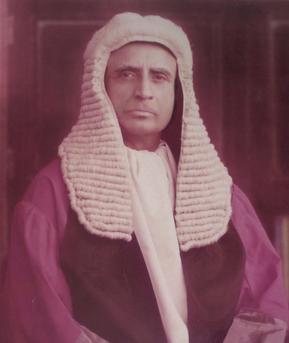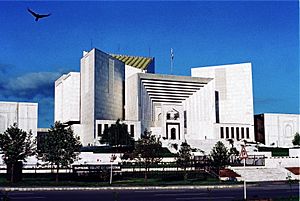Sheikh Anwarul Haq facts for kids
Quick facts for kids
Sheikh Anwarul Haq
|
|
|---|---|
| شیخ انوار الحق | |
 |
|
| 9th Chief Justice of Pakistan | |
| In office 23 September 1977 – 25 March 1981 |
|
| Nominated by | Zulfikar Ali Bhutto |
| Appointed by | Fazal Ilahi Chaudhry |
| Preceded by | Yaqub Ali |
| Succeeded by | Mohammad Haleem |
| Acting President of Pakistan | |
| In office 20 April 1978 – 7 May 1978 |
|
| Preceded by | Fazlul Qadir Chaudhry (29 November 1963 – 12 June 1965) |
| Succeeded by | Wasim Sajjad (18 July 1993 – 14 November 1993) |
| Senior Justice of the Supreme Court of Pakistan | |
| In office 16 October 1972 – 23 September 1977 |
|
| Nominated by | Zulfikar Ali Bhutto |
| Personal details | |
| Born |
Sheikh Anwarul Haq
11 May 1917 Jullundur, Punjab, British India |
| Died | 3 March 1995 (aged 77) Lahore, Punjab, Pakistan |
| Citizenship | |
| Nationality | Pakistani |
| Alma mater | Punjab University |
| Profession | Jurist |
Sheikh Anwarul Haq (born May 11, 1917 – died March 3, 1995) was an important Pakistani jurist, which means he was an expert in law. He served as the 9th Chief Justice of Pakistan from 1977 to 1981.
He studied economics at Punjab University in Lahore. In 1944, he became a civil servant in British India, helping to manage local governments. After Pakistan became independent in 1947, he continued his work as a civil servant. Later, he became a judge in the Sindh High Court in 1957.
In 1962, he joined the Supreme Court of Pakistan. He became the Chief Justice of Lahore High Court in 1970. In 1971, he returned to the Supreme Court as a Senior Justice. He became well-known in 1972 when he helped lead the War Enquiry Commission. This group investigated why Pakistan faced economic and military problems during the 1971 war with India. This war led to East Pakistan becoming Bangladesh.
He was known for his conservative views on law. He played a key role in Pakistan's history by supporting the martial law (military rule) put in place by General Muhammad Zia-ul-Haq. This was done to restore order in the country. As Chief Justice, he also heard the appeal case of former Prime Minister Zulfikar Ali Bhutto. Later, when General Zia-ul-Haq introduced a new law called the PCO to make his rule legal, Sheikh Anwarul Haq bravely refused to accept it. He resigned from his position in 1981 because he believed it was the right thing to do. He also encouraged other judges to refuse the PCO.
Life and Career
Early Life and Education
Sheikh Anwarul Haq was born on May 11, 1917, in Jullunder, a city in British India. He came from a Punjabi family. He completed his early schooling in Jullunder and Wazirabad. In 1932, he finished his high school (matriculation) and earned a scholarship to attend DAV College.
He studied Economics and Political science and earned his Bachelor of Arts (BA) degree in 1936. He then continued his studies at the Punjab University, where he earned a Master of Arts (MA) degree in Economics in 1938. He was the top student in his MA Economics class at Punjab University, setting a new record.
While at Punjab University, Sheikh Anwarul Haq was a great speaker. He often won speaking contests and debates. From 1936 to 1938, he was active in the All-India Muslim League. He supported the idea that Muslims in India should have their own separate identity. He even attended a major meeting of the All-India Muslim League in Calcutta in 1937 as a student representative.
Joining Public Service
In 1939, Sheikh Anwarul Haq was chosen to join the Indian Civil Service, which was a very important job in British India. He went to Oxford in the United Kingdom for further training. When he returned in 1940, he became an Assistant Commissioner in Ferozepur.
From 1942 to 1944, he worked as an Undersecretary in Punjab and the North-West Frontier. In 1944, he became a Sub Divisional Magistrate in Dalhousie, India, where he handled various legal cases. He also served as Deputy Commissioner and Session Judge in Gurdaspur in 1946. Briefly, he was the Deputy Commissioner of Hissar in 1946. In 1947, he worked as the Secretary for the committee that helped divide Punjab during the partition of British India.
After Pakistan was created in 1947, Sheikh Anwarul Haq chose to work for Pakistan. He became the Deputy Commissioner of Rawalpindi. He helped manage the people who moved to Pakistan after the partition. From 1948 to 1952, he continued his work as a Deputy Commissioner in Montgomery (now Sahiwal) and Sialkot.
In 1952, he joined the Ministry of Defence as a Deputy Secretary. In 1954, he went to London to study at the Imperial Defence College. He graduated in 1956 and returned to Pakistan. He was appointed Joint Secretary in the Ministry of Defence. Later, he moved to the Ministry of Law and Justice to become a federal judge.
Becoming a Judge
In 1957, he became a district-session judge in the Sindh High Court. In 1958, he moved to the Lahore High Court in Punjab.
In 1959, he was appointed as a judge in the West Pakistan High Court. In 1962, he became a senior justice in the Supreme Court of Pakistan. In 1965, he was the deputy leader of Pakistan's group at a major law conference in Sydney, Australia. In 1967, he became a member of the Law Reform Commission, which studied land reforms in Pakistan.
In 1969, he led a group of legal experts to Somalia to help with their constitutional problems. In 1970, President Yahya Khan made him the Chief Justice of Lahore High Court.
He was a witness to the war between India and Pakistan in 1971, which led to East Pakistan becoming Bangladesh. On December 26, 1971, he was named a member of the War Enquiry Commission (WEC). This commission, led by Chief Justice Hamoodur Rahman, investigated the reasons behind Pakistan's defeat in the war. On January 1, 1972, he was re-appointed as a senior justice at the Supreme Court of Pakistan.
Sheikh Anwarul Haq was also involved in many academic and educational activities. He was a member of the governing bodies of several universities, including:
- Punjab University
- University of Engineering and Technology, Lahore
- University of Agriculture, Faisalabad
- Allama Iqbal Open University, Islamabad
He was the President of the Himayat-i-Islam Law College in Lahore for many years. He also served as the acting Vice-Chancellor of Punjab University several times. From 1972 to 1974, he was a member of the 1971 War Inquiry Commission. In 1976, he became the Chairman of the National Pay Commission and the Armed Forces Pay Commission. He represented Pakistan's Supreme Court at celebrations in Accra, Ghana, in 1976. In 1977, he was appointed Chairman of the Commission on the Indus River System. In 1978, he became the Chairman of the Civil Services Commission. He was also the President of the British Universities Alumni Association in Lahore since 1962. He often gave speeches at social and cultural events in Lahore, Rawalpindi, and Karachi.
|
See also
- Chief Justice of Pakistan
- Supreme Court of Pakistan
- List of Pakistanis
| Legal offices | ||
|---|---|---|
| Preceded by Muhammad Yaqub Ali |
Chief Justice of Pakistan 1977–1981 |
Succeeded by Mohammad Haleem |
 | Sharif Bey |
 | Hale Woodruff |
 | Richmond Barthé |
 | Purvis Young |


